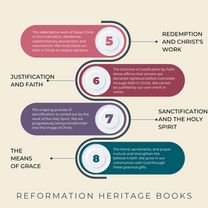Redemption and Christ’s Work: Theme #5 of the Westminster Shorter Catechism
Posted by Jonathan Landry Cruse on 29th Nov 2023
As the Shorter Catechism unfolds the story of redemption, it gives a decidedly Trinitarian answer to the question, “How is man saved?” This is fitting, of course, since the Bible itself gives a Trinitarian answer to the question as well. A survey of how the New Testament authors describe salvation would draw us to a similar conclusion as Herman Bavinck, who said, “It is in the doctrine of the Trinity that we feel the heartbeat of God’s entire revelation for the redemption of humanity.” Here again is evidence that the Catechism excels in presenting, in concise and memorable language, what the Scriptures have to say about the most important questions of faith and life.
In terms of salvation, the Westminster Divines present the Father as the initiator of our rescue from ruin:
Q. 20. Did God leave all mankind to perish in the estate of sin and misery?
A. God having, out of his mere good pleasure, from all eternity, elected some to everlasting life, did enter into a covenant of grace, to deliver them out of the estate of sin and misery, and to bring them into an estate of salvation by a redeemer.
The same God who created man, who was then betrayed and blasphemed by man, is the God who will save man. By His design, that salvation will come to mankind “by a redeemer,” leading us to one of the most exhilarating questions and answers of the entire catechism: “Who is the redeemer of God’s elect?” (Q21). This is the most important question any of us could ever ask, and the answer formulated by the Catechism lifts us to Christological heights of praise and wonder:
The only redeemer of God’s elect is the Lord Jesus Christ, who, being the eternal Son of God, became man, and so was, and continueth to be, God and man in two distinct natures, and one person, forever.
The Son of God became man to be our substitute: one who would live the life we are called to live, and then even die the death we deserve to die. But even now as the resurrected and ascended Savior, Christ still bears our human nature, interceding before the Father for our every need. Put another way, everything we need to be saved and to stay saved is found in the person of Christ. No wonder the 19th-century Scottish pastor Edward Irving once said about this question and answer, “I would not give the truth expressed in these words … for all the truths that by human language have ever been expressed.”
The Catechism goes on to explore the full breadth of Christ’s atoning work through the offices of prophet, priest, and king. Jesus is the great prophet who leads us into all truth; the high priest who atones for sin; the mighty king who secures us from enemies who would try to pull us away from God. Understanding Jesus’s threefold office helps us avoid an imbalanced faith. If we overlook His prophetic ministry, we are left with a powerful and sacrificial Lord who refuses to share His mind with His friends. If we miss His priestly service, we are left with a philosopher king whose strength and wisdom rule and inform us but don’t necessarily transform us. If we forget His kingly rule, we have a wise, sacrificial Savior who has no claim on our lives. We need the whole Christ—and that’s exactly what the Holy Spirit gives to us:
Q. 29. How are we made partakers of the redemption purchased by Christ?
A. We are made partakers of the redemption purchased by Christ, by the effectual application of it to us by his Holy Spirit.
Q. 30. How doth the Spirit apply to us the redemption purchased by Christ?
A. The Spirit applieth to us the redemption purchased by Christ, by working faith in us, and thereby uniting us to Christ in our effectual calling.
Without the work of the Third Person in the Trinity, the plan of the Father and the exception of that plan by the Son would never benefit us. But the Holy Spirit brings us to Christ and all that is in Him. He makes Christ ours.
Is He yours? You don’t need to pine for the glory of the cross and the bliss of salvation as though their blessings are an unattainable fantasy. You can enjoy these yourself, right now. The work of the Spirit is to break down the partition of sin that would keep us from Christ, producing faith in our hearts and uniting us to our Savior. And it is this “union alone,” said Calvin, “that ensures, as far as we are concerned, [Jesus] has not unprofitably come with the name Savior.”
by Jonathan Landry Cruse

Devotions in the WSC? Sign me up!
Glorifying and Enjoying God: 52 Devotions through the Westminster Shorter Catechism is now available from Reformation Heritage Books. Get your copy today and begin your devotions through the WSC in just a few days from now.

